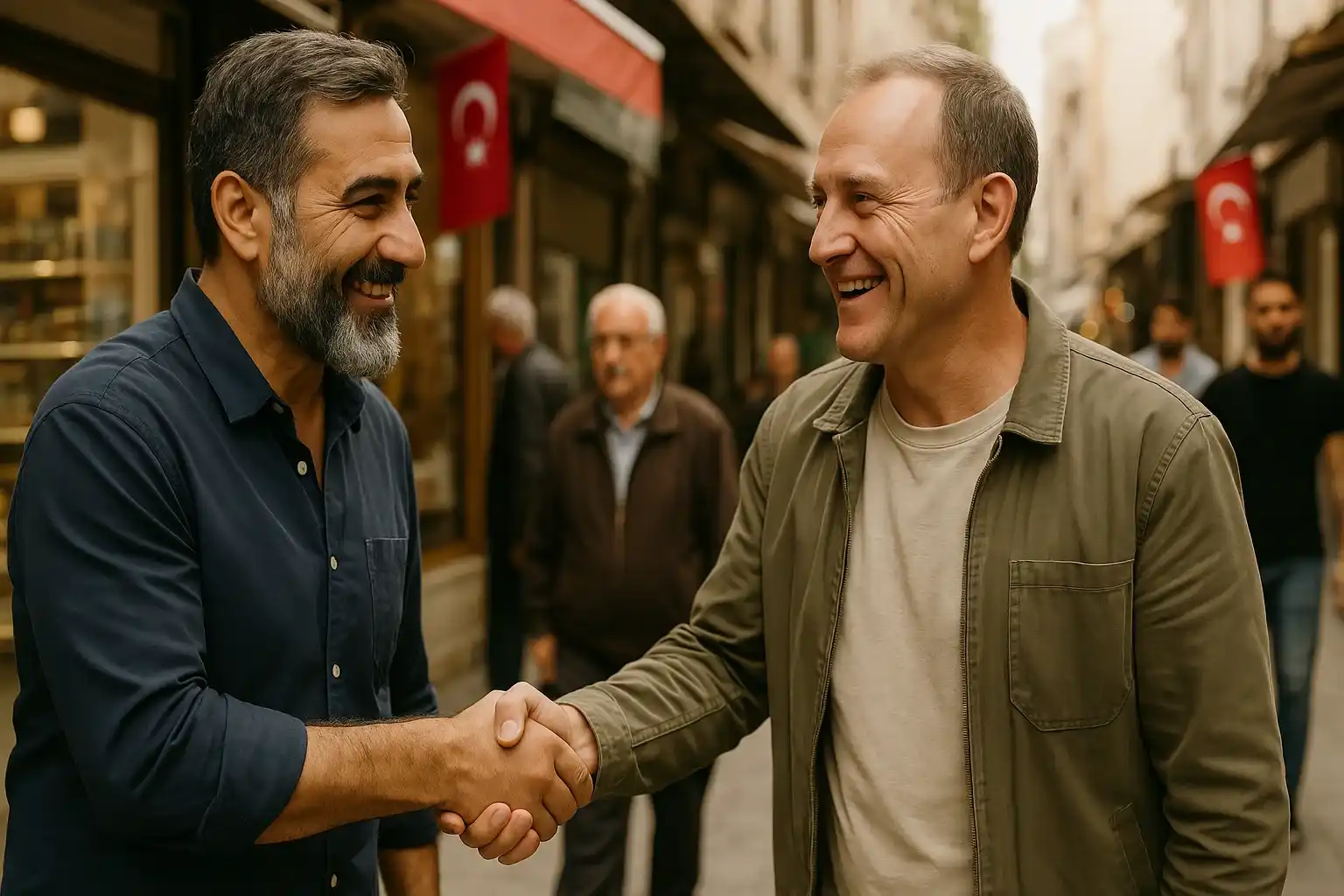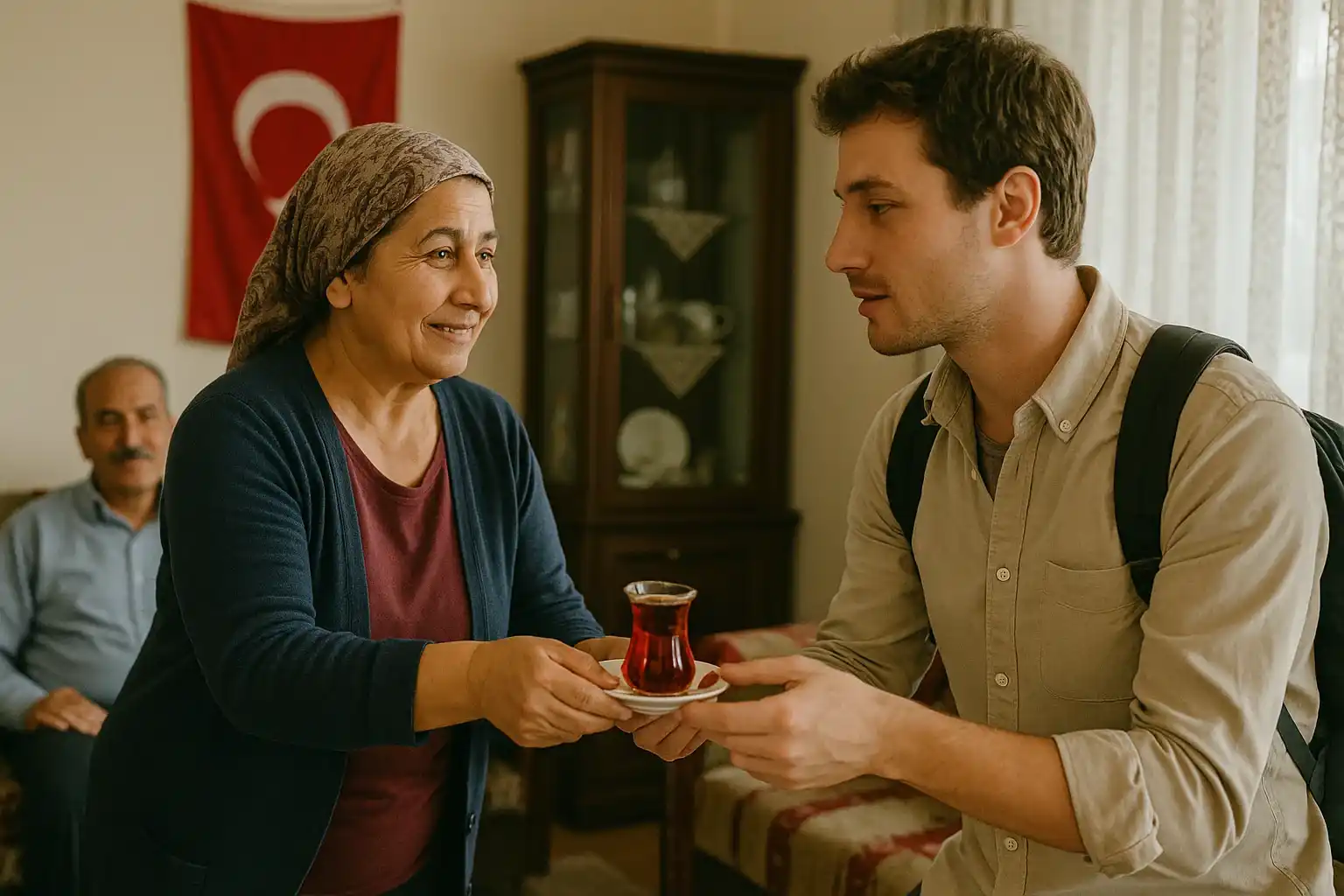Have you ever caught yourself searching Google not for “best places in Cappadocia” but, say, what does no location found mean on iPhone? These searches speak both of technological glitches and also how easy it is to feel insecure in an unfamiliar environment. Especially in a different country, where many things – from smiling to silence – can mean very different things than you are used to.
In Turkey, with its ancient traditions and colorful temperament, such “signals” surround you at every turn. And in order not to perceive them as errors in the system, it is worth finding out in advance what exactly can be confusing – but in fact turns out to be quite normal.
- Refusals Are Just the Beginning
We are all used to this, and in many parts of the world, “No” means “No.” In Turkey, that is not always the case – especially when it comes to food, help, or gifts. Often, the first refusal is simply a way of being polite, modest, or humble. Locals expect you to insist a little and maybe even twice.
Imagine this: you offer someone a piece of baklava, and they say, “No, thank you.” You smile, start eating yours – and they look slightly disappointed. That is because you weren’t supposed to give up so fast.
Here’s how it works:
- The first “no” = politeness
- The second “no” = mild resistance
- The third try = usually a “yes,” with a smile
This charming ritual is part of a broader culture of indirect communication, where modesty and generosity dance in subtle patterns.
Travel tip: When offering something – tea, help, or a small gift – don’t retreat at the first sign of hesitation, as your gentle insistence is expected and appreciated. And remember if you are too quick to accept a refusal, you might unknowingly shut down a moment of shared warmth or connection.
- Invitations Are Often Unexpected (and Very Real)
You’ve just met someone. Maybe it was at a local shop, a park bench, or while asking for directions. And suddenly, you are invited home for tea. In Turkey, this isn’t small talk – it’s a sincere gesture. And if you accept, don’t be surprised if that tea turns into dinner… and possibly a sleepover.
This is especially true in small towns and villages (here hospitality is a way of life). The guest isn’t just welcome, they are always honored. In fact, in many homes, it is believed that unexpected guests bring luck. And turning one away? That’s just not done. And even if you’re unsure about staying long, never refuse the first cup of tea. It is more than a drink – it is an open door.
By the way, this fact is also proven by a recent survey by TÜİK, when over 75% of rural Turkish households said they would offer food and drink to any visitor without hesitation – stranger or not.
Helpful tip: If you are heading somewhere new with someone you’ve just met, drop a pin or use a live location app like Number Tracker to stay connected with your travel buddies. It is a small thing that brings big peace of mind.
- A Kiss on the Cheek (Yes, Between Men)
In many Western countries, personal space is sacred. So, watching two Turkish men greet each other with cheek kisses might seem surprising. But in Turkey, this is a completely normal, non-romantic gesture shared between male friends, brothers, or longtime colleagues.
It is usually one kiss on each cheek and often paired with a strong handshake or shoulder touch. It communicates familiarity, trust, and mutual respect – not awkwardness. In fact, not greeting a close friend this way may seem distant or cold.
When and where it happens most often:
- Family reunions or holiday visits
- Weddings and funerals
- Between neighbors in smaller towns
- Among military or school friends
Travel tip: If someone offers this greeting to you, don’t panic. You can gently smile and offer a handshake or nod if you are not comfortable. What matters is your openness – not perfect execution.

- Bargaining Is Expected — and Enjoyed
A Turkish bazaar is an explosion of sounds, colors, aromas, and friendly chaos. But there is one rule above all: never accept the first price. Bargaining is part of the tradition, and it’s as social as it is economic.
Locals expect it and enjoy it. Sellers will often offer tea mid-negotiation and engage in small talk before you even mention money. To refuse to haggle is to miss the performance. Below in the table is a quick guide to useful Turkish phrases that might just get you a better deal:
| Turkish Phrase | Meaning | When to Use |
| İndirim var mı? | Is there a discount? | To open the conversation |
| Bu biraz pahalı | This is a bit expensive | When reacting to a high first price |
| Son fiyat nedir? | What’s the final price? | Near the end of bargaining |
| Nakit ödersem indirim olur mu? | Can I get a discount if I pay cash? | For extra leverage |
Travel tip: Smile, stay polite, and see it as a game. If you walk away and the seller follows you – it means you’re close to your price. But don’t bargain if you don’t intend to buy it is often accepted as being rude. And never raise your voice, as Turkish sellers value friendly negotiation, not confrontation.
- Tea Is Not a Drink — It Is a Ritual
You will be offered tea everywhere in Turkey, not because you look thirsty, as it is a sign of welcome. Refusing a cup may unintentionally close a door that was just kindly opened.
Tea (çay) is a national symbol- and a social glue, it is always served in tulip-shaped glasses, always hot, and often sweet. Whether you are shopping for carpets, getting a haircut, or waiting for a bus, someone will eventually say: “Çay ister misiniz?” (“Would you like some tea?”)
What makes tea special in Turkey isn’t the drink itself but the act of slowing down and sharing time.
Where you’ll almost always be offered tea:
- Local shops and markets
- Homes, even during short visits
- While negotiating business deals
- By taxi drivers or barbers as a kind gesture
Pro tip: If you’re short on time, just sip politely and say “elinize sağlık” – a compliment to the host’s effort, roughly meaning “health to your hands.” You should also know that flat-out “no” can seem rude. If you’re full or rushed, say “maybe later” or just accept a few sips – it’s more about the gesture than the tea itself.

- “No Problem” — Even When There Is One
Turkish people are famous for their optimism in the face of, well, everything. The phrase “problem yok” (no problem) is used generously – even when there’s clearly a delay, mix-up, or confusion. Missed a bus? Problem yok. The hotel doesn’t have your reservation? Still, problem yok.
At first, this might feel like denial. But really, it reflects a cultural calmness – an unshaken belief that everything will sort itself out. It’s not indifference but also trust in time, flexibility, and a bit of divine patience.
When to expect to hear “problem yok”:
- At restaurants when the order is wrong
- During travel hiccups like delays or overbookings
- Even after asking for last-minute favors
Helpful mindset: Instead of pushing for instant resolution, lean into the relaxed pace. Most things do get fixed – just not always with urgency.
Understanding without Translation
A lot of things in Turkey don’t work according to the usual algorithms, and it’s not a bug – it’s a feature of the system. The sooner you accept this, the faster you will start to enjoy a culture where a pause is a sign of respect, “no” is an invitation, and “everything is fine” sometimes means “yes, not right away, but it will be”. Turkey loves those who can read between the lines – and it reciprocates.
